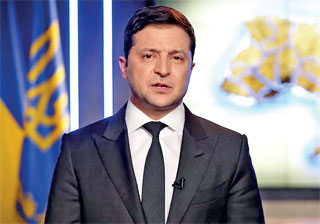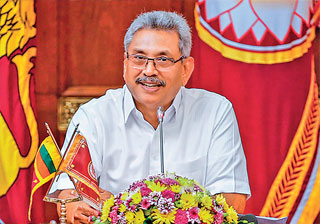Volodymyr Zelenskyy and Gotabaya Rajapaksa
His political party Servants of the People was formed in late 2017 and registered in 2018. By the time he became the President, Ukraine was having strong nationalistic ideology and that was anti-Russian and pro-Western.
Prior to the rule of Soviet Union, Ukraine was under Russian and Polish rule. Ukraine became independent in 1991 after the collapse of the Soviet Union. Thereafter Ukraine started moving towards the West. During the time of Soviets, the common language of Ukraine was Russian and after the Independence Ukrainian became the official language. However, the local authorities had the power to confer official status upon minority languages. Although Ukrainian was reaffirmed as the country’s official language, regional administrators could elect to conduct official business in the prevailing language of the area.
In 2010, Viktor Yanukovych was re-elected president with 48% of votes. A wave of demonstrations and civil unrest called Euromaidan has begun in November 2013 mainly to protest the suspension of preparation of signing an Association Agreement with European Union by the President and by and large to protest the widespread government corruption, abuse of power and violation of human rights under the then President who was loyal to Russia.
United States intervened in the unrest under the Obama administration and it was reported that US invested around $ 5 billion in ‘developing Ukrainian Democratic Institutions’. The extent of intervention could be understood through the leaked telephone conversation between Victoria Nuland, then US Assistant Secretary of State and Geoffrey Pyatt, then US Ambassador to Ukraine. Nuland is the current US Under Secretary of State who has visited Sri Lanka recently.
 |
| Ukranian President Volodymyr Zelenskyy |
 |
| President Gotabaya Rajapaksa |
Yanukovych was ousted from power in February 2014 and Russia invaded Crimea and annexed it to Russia in March 2014. The next President was Petro Poroshenko. He signed new law on supporting the functioning of the Ukrainian language as the state language on 25 April 2019. This is no ordinary law but an extreme piece of legislation with different dates of enforcement of different articles.
For instance, Article 25 which came into operation on 16 January 2022, just prior to the invasion of Russia, deals with the state language in the field of print mass media. According to that print mass media in Ukraine shall be published in the State language and it may be published in other languages than the State language, provided that an edition in the State language is published concurrently with a corresponding edition in a foreign language. All language versions must be published under the same title, be similar to each other in their content, size and printing method, and their editions must have the same consecutive numbering and be issued on the same day. Further it is not applicable to the print mass media published exclusively in the Crimean Tatar language, other languages of indigenous peoples of Ukraine, in the English language or another official language of the European Union.
There was no say for the Russian language. The law aimed to revitalise the Ukrainian language and is part of government efforts to reinforce national identity after the fall of the Soviet Union but this raises concerns about protection for minority languages including Russian language.
According to Article 40 which deals with the State language in personal names, surnames, first names and patronymics of citizens of Ukraine shall be made in the State language according to the rules of Ukrainian spelling, be conveyed by transliteration into the letters of a relevant alphabet according to pronunciation thereof in the State language and shall not be translated into other languages.
Therefore, these were very stringent measures and they wanted to deviate from the dominance of Russian language. Thereby there was a perceived discrimination against the Russian minority concentrated in the areas in the Eastern Ukraine, by the Russian government.
When Zelenskyy came in to power the public mind in Ukraine was set against Russia which was backed by the West. Therefore, managing Russia at that point was a too serious task which could have been handled by a person with the calibre of a seasoned statesman rather than by a political novice.
Going against Russia was simple and that was what Zelenskyy did, but the task was to be independent while not antagonising Russia. That was what Finland did. Zelenskyy’s primary responsibility was towards the people of Ukraine. He failed to safeguard them.
The primary concern of Russia was its security. Without addressing that one cannot survive in the border of Russia. It is the same in respect of US or any other powerful country. One can argue about sovereignty and equality of the nations. Those are only in the textbooks. In that case it could be argued that the veto power of the five nations in the UN security council be abolished.
Now Zelenskyy is getting standing ovations for his virtual addresses to the parliaments of powerful western nations. What is the use? Russia continues the destruction in Ukraine. He says that the destruction in Mariupol by the Russian troops will be remembered for centuries. What is the use? Can the deaths of 900 odd civilians be remedied?
Yes, Putin is a dictator as claimed by Boris Johnson and he is a war criminal as claimed by Joe Biden but if Johnson or Biden were in the place of Putin, they also would have done the same thing since none of them have respect for the human lives especially of the small nations when it crosses their security concerns.
This is a classic example of causing immense hardships to the people of a small country when it comes within the axis of security concerns of big powers and when it lacks able leadership at the helm.
Gotabaya Rajapaksa
Gotabaya Rajapaksa also was a political novice when he came to power. Tragically he remains a political novice to date. He is a retired Lieutenant Colonel of Sri Lanka Army. He worked as the secretary to the Ministry of Defence during the war and did a remarkable job.
He came to power with popular vote promising a system change and a corruption-free country. People voted both Zelenskyy and Rajapaksa anticipating that they would minimise corruption.
In the world corruption perception index from least corrupt (Denmark 88) to most corrupt (South Sudan 11) Ukraine is ranked 37 and Sri Lanka is ranked 32 in 2021.
People voted for him had strong nationalistic mentality directed against the ethnic minorities of the country compared to Ukrainians where it was directed against the Russians.
Rajapaksa’s biggest disaster was handling the economy where he did not have an in-depth understanding. That is why his pseudo advisors could have taken him for a ride at the expense of the national interest in respect of organic farming.
In the macroeconomics the disaster was manmade. Reducing taxes, money printing, reducing interest rates, maintaining artificial exchange rates and relying on so-called homegrown solutions without soliciting the IMF support were the main ingredients of it.
The IMF in its press release on 25 February 2022 stated as follows emphasising on the social safety nets negating the criticism against them: “Against this backdrop, they stressed the urgency of implementing a credible and coherent strategy to restore macroeconomic stability and debt sustainability, while protecting vulnerable groups and reducing poverty through strengthened, well-targeted social safety nets.”
Eventually the country suffered a lot and the vote base of the ruling party got eroded. He has paved the way for the next government to have unprecedented majority votes in the coming presidential or parliamentary elections. We know what a damage an overly powerful government could do to the country. Rajapaksa himself is an example. As a result, unlike in 2015 where all the Opposition parties got united against the existing regime since they were not sure whether it could be defeated, now each of the Opposition parties think that power would be fallen to their laps. Hence there are no common programs or consensus without which the economy of the country cannot be rescued.
The plight of the two countries shows the extent of the damage the inexperienced political leaders could cause.


%20(1)%20(3)%20(1)%20(1).png)

No comments:
Post a Comment
Note: only a member of this blog may post a comment.